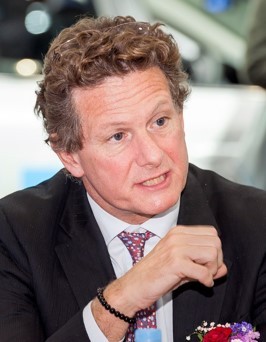DAEGU -- French automaker Renault Group’s top executive is optimistic about the Korean electric car market due to the government’s strong push for vehicle electrification and local firm’s advanced capabilities of car components.
“When we launched our electric cars in Korea five years ago, many people were skeptical, saying the green cars will not be working in Korea,” said group’s senior vice president Gilles Normand in an interview with The Korea Herald at Daegu International Future Auto Expo on Thursday.
“Look, now the electric car market here has grown to account for nearly one percent (of the total automobile market) and many automotive and parts players are now joining the industry,” Normand said of the Daegu expo where 158 electric car-related companies joined.

Renault Group’s Senior Vice President Gilles Normand visits Daegu International Future Auto Expo in Korea on Thursaday. (Renault Samsung Motors)
The senior vice president cited the government’s strong push and local tech firms’ advanced technologies as the reasons for the upbeat outlook for the green car market here.
“Korea has very strong requirements for the fuel economy by the Environment Ministry. Under the regulation, each carmaker should be bound to improve fuel efficiency and (developing) electric cars are the only way to improve fuel efficiency,” the top executive said.
Korea’s first mandatory fuel economy standards took effect in 2006 and they have 2020 targets that require fuel consumption reductions of 31.1 percent for cars and 15.2 percent for light trucks compared to a 2013 baseline.
The annual sales of the EV market in Korea rose more than 100 percent on average from 1,000 units in 2014 to over 10,000 units this year.
“Korea’s high level technology skills and capabilities to develop autonomous driving is another reason I am also convinced about the nation’s future EV market,” Normand said. He said autonomous driving will be electric in the future.
Currently, local tech giants, Samsung Electronics, LG Electronics, Naver and Kakao are all keen on developing electric and automotive driving technologies to brace for the future self-driving era. Korea also has three leading battery firms, LG Chem, Samsung SDI and SK Innovation, which are supplying their batteries to most global EV makers, including Renault, Volvo, Volkswagen, BMW, Mercedes-Benz and Audi.
By working with LG Chem, Renault Samsung Motors, the Korean unit of the French carmaker, launched SM3 Z.E., on Thursday. It increased its autonomy by 57 percent from the previous model, to 213 kilometers, which is the longest record in the EV segment.
Although LG Chem is currently Renault’s strong battery supplier for Renault, the opportunity is always open to other firms, Normand said.
“Obviously in the automotive industry, we are always open to look for working with different suppliers and it depends on who can offer better battery chemistry, cost competitiveness and durability,” he said.
Last month, Renault announced that it would double electric-car models in the next five years as the carmaker rolls out eight new or revamped wholly battery-powered cars and adds 12 hybrid vehicles by 2022. Renault said it would team up with Nissan and Mitsubishi on self-driving and electric cars.
Normand said the firm is welcome for more competitors as they can make technology breakthrough together and the alliance can save production costs through common platforms.
Currently, Renault is producing cars through common platforms with Nissan and it also plans to expand the partnership with Mitsubishi
Normand started his career at Renault, in 1988, at product planning department. In April 2012, he became senior vice president and chairman of Asia-Pacific region of Renault Group. Since last year, he has been the group’s senior vice president for electric vehicles. He is a member of the Renault Management Committee.
Renault Samsung Motors, founded in September 2000, is an automaker based in Korea. The company is one of the brands of the Renault Group, selling 257,000 vehicles in 2016 with 8 line-ups (SM3, SM5, SM6, SM7, QM3, QM6, SM3 Z.E., and Twizy) and employing more than 6,500 people. Renault Samsung Motors has an industrial site in Busan which is one of the top four sites within the Renault Group, and it develops the next generation of sedan and SUV in D-segment of the Groups in its R&D center, Renault Technology Korea and design center, Renault Design Asia.
By Shin Ji-hye (shinjh@heraldcorp.com)






